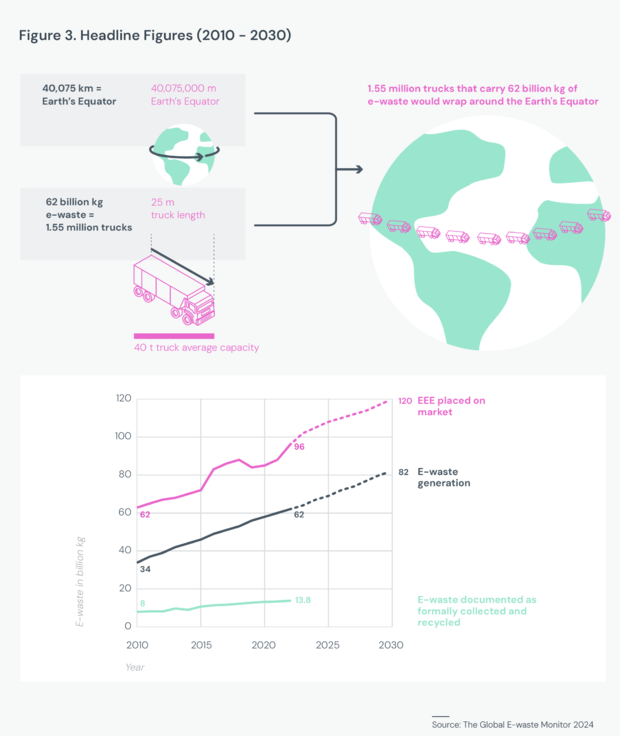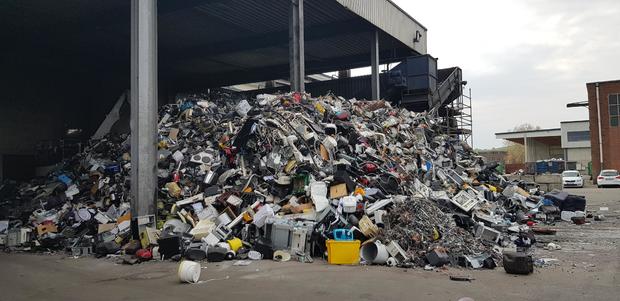There's so much electronic waste in the world it could span the equator – and it's still growing
All those old wires, cords, tablets, phones and other electronics aren't just taking up space in drawers and closets – they're also extensively covering the planet. A United Nations report released Wednesday states the amount of electronic waste is rising substantially faster than those items are being recycled, so much so that right now, that waste could span the equator.
The report found that the world is trashing electronic products at a rate five times faster than e-waste recycling. In 2022 alone, people generated 136.6 billion pounds of e-waste – enough to fill so many 40-metric-ton trucks that they could form a bumper-to-bumper traffic jam across the imaginary line that divides the northern and southern hemispheres. Just over 22% of all that waste was formally collected and recycled.
And that figure still growing. The report predicts that an additional 5.7 billion pounds of e-waste is generated every year.
Meanwhile, researchers predict that recycling of the products is only going to decrease. The recycling rate in 2022 was 22.3% and the U.N. believes that number will drop to 20% by 2030, at the same time that the world will generate 82 million metric tons of e-waste.
"E-waste, any discarded product with a plug or battery, is a health and environmental hazard, containing toxic additives or hazardous substances such as mercury, which can damage the human brain and coordination system," according to a news release from the U.N. Institute for Training and Research.
Most of that waste is small items, like toasters, while solar panels make up the smallest category of waste products. And many of those items end up traveling across the world.
The report found that more than 1.1 billion pounds of e-waste is shipped country to country every year, much of which in "uncontrolled transboundary movements" from high-income nations to those considered to be middle- or low-income. CBS News followed this problem as far back as 2008, when "60 Minutes" correspondent Scott Pelley followed the path of recycled computer parts in Denver, Colorado, to a toxic dump in China.
Following the movement of these items is difficult as it can often be done illegally, the U.N. report says. While most countries are required to adhere to a set of international rules regarding exports of e-waste known as the Basel Convention, it's not uncommon for shipments to be intentionally mislabeled to avoid having to adhere to the rules.
It's imperative in managing the issue for nations to have their own e-waste policies, the report says. But out of the 193 analyzed in the report, just 81 have adopted e-waste policies, legislations or regulations. The quality of those actions is also in question, as the report says "a substantial number" don't set targets for collecting and recycling the waste.
E-waste's impact on Earth
The U.N. report says that unmanaged e-waste "has a direct impact on the environment and people's health." This type of waste is known to have toxic substances, including flame retardants often found in screens and monitors, and many of the hazardous substances within these materials can be inhaled when the items are burned.
Gathering materials to create electronics is also harmful to people and the environment, as it requires mining rare materials that can be difficult to extract.
"Large volumes of rock have to be extracted to produce a substantive amount of the minerals containing the metals," the report says. "For instance, 3 million kg of mineral ore [6.6 million pounds] have to be mined to produce 1 kg [2.2 pounds] of gold."
Extracting those resources from e-waste instead can avoid billions of pounds of CO2-equivalent emissions, the report found.
And recycling certain kinds of e-waste, including refrigerators, freezers, air conditioning systems and other kinds of temperature exchange equipment, can limit the amount of chemicals they often release into the atmosphere when disposed. Those chemicals react with other molecules and thin the ozone layer, allowing in more radiation from the sun and contributing to climate change and increasing UV risk to people. More than three-quarters of that equipment is "managed in an environmentally unsound manner," according to the report.
The future of e-waste
The U.N. says the rampant increase in electronic waste is "cause for concern and requires immediate attention and action." As things stand, the report forecasts that collection and recycling of e-waste could drop by 2030 as higher consumption, limited repair items, shorter product life cycles and other facts widen the gap in recycling efforts.
But if more policies and actions are implemented, the U.N. found that those rates could drastically improve in the same timeline. By 2030, collection and recycling could increase to 60%, with benefits outweighing costs by more than $38 billion.
"No more than 1% of demand for essential rare earth elements is met by e-waste recycling," said Kees Balde, lead author of the report. "Simply put: Business as usual can't continue. This new report represents an immediate call for greater investment in infrastructure development, more promotion of repair and reuse, capacity building and measures to stop illegal e-waste shipments."










